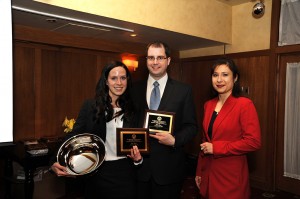
Kara Frankman (left) and Christopher Dabney (center) hold the awards as the winners of the 31 st annual International Moot Court Competition in Information Technology and Privacy Law. They are congratulated by Center associate director Panagiota Kelali (right).
A team from the University of South Dakota School of Law won top honors in Chicago at The John Marshall Law School in the 31st annual International Moot Court Competition in Information Technology and Privacy Law, held Oct. 25 through 27, 2012.
Team members Christopher Dabney and Kara Frankman competed against 23 other teams from the United States and India over the three days. They addressed an invasion of privacy issue and a claim of employment termination based on sexual orientation in violation of the State Human Rights Act.
Second-place honors were awarded to IIT/Chicago-Kent College of Law, and the semi-finalists teams were from Southern Methodist University’s Dedman School of Law and Baylor Law School. An honorable mention was given to Brooklyn Law School, and the Ambassador Round winner was South Texas College of Law.
Mary Green of Baylor Law School won the “Best Oralist” honors; Texas Wesleyan School of Law received the “Best Petitioner Brief” honor and the University of South Dakota received the “Best Respondent Brief” honor.
“This was an exceptional competition with a wonderful group of competitors,” said Professor Leslie Ann Reis, director of the Center for Information Technology and Privacy Law, who with her colleagues Professor Emeritus George Trubow, Professor David Sorkin, and Center associate director Panagiota Kelali has been running the competition for more than a dozen years.
“It is hard to believe that we have been hosting this competition for more than 30 years, but issues focusing on privacy and new technologies and their uses are more commonplace today than ever before. When you read past competition problems, it is interesting to see how many issues that the competition explored have come before the courts and influenced law and law practice in a profound way,” Reis noted.
Professors Reis and Sorkin work with John Marshall students who write each year’s competition problem. Competitors in years past have addressed questions at the intersection of technology and privacy involving social media, surveillance, GPS tracking, national security, Internet defamation and much more. “It is encouraging to know that we at John Marshall are training lawyers with outstanding credentials in technology and privacy law. The competition is a terrific opportunity for students at other law schools to gain exposure to this increasingly important area of law and see the value of courses in privacy and information technology,” she added.
The schools from the United States that participated in the competition were: Southern Methodist University’s Dedman School of Law, Michigan State University College of Law, South Texas College of Law, William Mitchell College of Law, IIT/Chicago Kent College of Law, University of California at Hastings College of the Law, Stetson University College of Law, Brooklyn Law School, Baylor Law School, New York Law School, Loyola University-New Orleans College of Law, Texas Wesleyan School of Law, George Mason University School of Law, University of Kansas School of Law, South Dakota School of Law, Villanova University School of Law, Florida Coastal School of Law.
Schools from India that participated were Gujarat National University, National Law University and New Law College of India.

